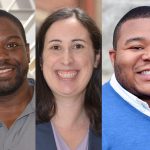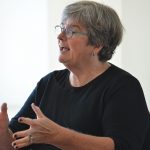“There’s a certain pride that I think students take, and staff takes, at a magnet school because they’re doing something a little more special,” Casey Cobb said. “They’re focused on some theme, and that’s distinct from a traditional kind of comprehensive curriculum.”
Congratulations to our Neag School alumni, faculty, staff, and students on their continued accomplishments inside and outside the classroom.
“During the 20th century, there was nothing that could help you achieve labor market success more than a good education. Even today, education is one of the strongest predictors of whether someone is employed and how much he or she is paid,” says Shaun Dougherty, assistant professor of education and public policy at UConn’s Neag School of Education.
During the 20th century, there was nothing that could help you achieve labor market success more than a good education. Even today, education is one of the strongest predictors of whether someone is employed and how much he or she is paid.
Yet, the rules have changed.
Cooper said members of the UConn campus community felt this was an important time to reaffirm their commitment to the university being a safe and invigorating place where intellectual, educational, and personal growth are valued and manifested.
The U.S. Department of Education has awarded $1.3 million in funding through its Office of Special Education Programs (OSEP) to the Neag School’s special education program for a project that will fully fund five doctoral students in the areas of literacy, positive behavioral supports, and transition, with four-year competitive fellowships for each student.
Two Neag School researchers are members of an interdisciplinary UConn-based team recently awarded a $3 million grant through the National Science Foundation (NSF) Research Traineeship program to prepare the next generation of Ph.D. students.
The Neag School of Education welcomes three new faculty members this fall.
Last year, IES funded a CTE research project under a different topic, Improving Education Systems. In this project, the University of Connecticut is examining the impact of attending a CTE-focused high school on students’ achievement, high school graduation, and college enrollment.
Neag Endowed Professor of Teacher Education Suzanne M. Wilson has been named head of the Department of Curriculum and Instruction (EDCI) at the Neag School. She takes over for Mary Anne Doyle, who served as department head for 17 years and returned to a faculty role to focus on literacy research.






